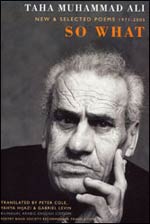 New & Selected Poems 1971-2005
New & Selected Poems 1971-2005
(Bilingual Arabic-E,glish)
Translated by Gabriel Levin and Peter Cole
Bloodaxe Books, London
197 p.
Despite his spare output and lack of formal education, Ali has become one of the most widely admired Palestinian poets. Composed in a synthetic Arabic that draws both on classical language and colloquial speech, Ali's vivid free verse conveys the moody resilience of his personality in treatments of the national grief of occupation, exile and the Palestinian Arabs' "endless migration." Often informed by symbols and structures from Arab tradition, Ali's ironies stand alongside easily grasped, even universal, versions of lament: "We did not know/ at the moment of parting/ that it was a moment of parting." Expanding an earlier rendition of Ali's works, the multinational translating team clearly transmits Ali's humor, his way with a tale and his deep roots in "fatigue, hunger, vagrancy,/ debts and addiction to ruin." Composed between the early 1970s and now, Ali's poems are timely and affecting; his 1984 masterpiece, "The Falcon," portrays the poet as a migratory bird indebted less to his companions than to his own "sadness... so much greater than I am." A moving, richly poetic story, in which all the deprivations of Ali's verse coalesce in a child's desire for a pair of shoes, closes the collection. (Oct.) From Publishers Weekly
"Taha Muhammad Ali speaks with an emotional forthrightness. . . . He has developed a style that seems both ancient and new, deceptively simple and movingly direct."-The Washington Post
Taha Muhammad Ali is a revered Palestinian poet whose work is driven by vivid imagination, disarming humor, and unflinching honesty. As a boy he was exiled from his hometown, but rather than turning to a protest poetry of black-and-white slogans to convey this loss, he has created art of the highest order. His poems portray experiences that range from catastrophe to splendor, each preserving an essential human dignity.
Excerpt:
Neither music
fame nor wealth,
not even poetry itself,
could provide consolation
for life's brevity,
or the fact that King Lear
is a mere eighty pages long, and comes to an end,
and for the thought that one might suffer greatly
on account of a rebellious child.
So What includes Arabic en face and introductions by co-translators Gabriel Levin and Peter Cole. Muhammad Ali will be one of the international poets featured at the 2006 Dodge Poetry Festival, and he will embark on a reading tour of the United States in the fall of 2006.